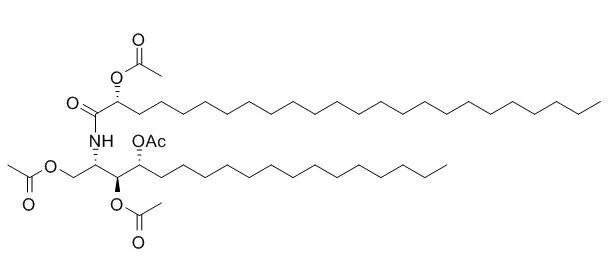| Description: |
(2S,3S,4R,2′R )-2-(2′-Hydroxytetracosanoylamino) octadecane-1,3,4-triol at concentration of 100 ug/mL shows selectively inhibitory activity against phospholipase A 2 (PLA 2) secreted from Crotalus adamenteus venom, but inactive against PLA 2 of bee venom (Apis mellifcra). |
| In vitro: |
| Chinese Journal of Organic Chemistry, 2003,23(8): 853-7. | | Chemical Constituents of the Fungus Leccinum extremiorientale[Reference: WebLink] |
METHODS AND RESULTS:
Thirteen chemical constituents were isolated from the fruiting bodies of basidiomyctes Leccinum extremiorientale, and their structures were elucidated by spectral and physical-chemical data as: ergosta-7,22-dien-3β,5α,6β-triol (1), ergosterol peroxide (2), ergosterol (3), ergosta-4,6,8(14),22-tetraen-3-one (4), ergosta-5,7-dien-3β-ol (5), palmitic acid (6), (2S,3S,4R,2′R)-2-2'-(Hydroxytetracosanoylamino)-octadecane-1,3,4-triol (7), cerebroside B (8), cerebroside D (9), uracil (10), inosine (11), adeosine (12) and D-allitol (13). The NMR data of compounds 8 and 9 were completely assigned by 2D-NMR techniques, including 1H-1H COSY, HMBC and HMQC.
CONCLUSIONS:
Compounds 2, 7 and 8 at concentration of 100 μg/mL showed selectively inhibitory activity against phospholipase A 2 (PLA 2) secreted from Crotalus adamenteus venom, but inactive against PLA 2 of bee venom (Apis mellifcra). In addition, the methanol-chloroform soluble extract of this fungus also showed 67% antifeedant rate against Leucaninia separata and caused 55% mortality against Plutella xylostella after three-day application. |
|






 Cell. 2018 Jan 11;172(1-2):249-261.e12. doi: 10.1016/j.cell.2017.12.019.IF=36.216(2019)
Cell. 2018 Jan 11;172(1-2):249-261.e12. doi: 10.1016/j.cell.2017.12.019.IF=36.216(2019) Cell Metab. 2020 Mar 3;31(3):534-548.e5. doi: 10.1016/j.cmet.2020.01.002.IF=22.415(2019)
Cell Metab. 2020 Mar 3;31(3):534-548.e5. doi: 10.1016/j.cmet.2020.01.002.IF=22.415(2019) Mol Cell. 2017 Nov 16;68(4):673-685.e6. doi: 10.1016/j.molcel.2017.10.022.IF=14.548(2019)
Mol Cell. 2017 Nov 16;68(4):673-685.e6. doi: 10.1016/j.molcel.2017.10.022.IF=14.548(2019)